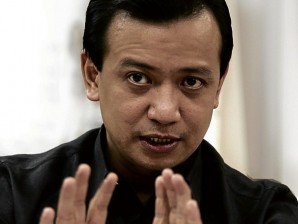MANILA, Philippines—Reelectionist Sen. Antonio Trillanes IV has accused one of the Big Two polling firms of “massaging” the results of its surveys to benefit paying candidates.
“An ‘operator’ from a major survey firm sent word through my staff that we could get advance (information) on where and when they would conduct a survey, apparently to allow us to massage or cook the results. I’m not sure which one of the two survey firms sent us the message,” Trillanes told a press conference on Monday.
The senator was referring to the country’s most cited preelection pollsters—Pulse Asia and Social Weather Stations—that ranked him number 20 and 16, respectively, in their last survey just before the 2007 elections.
Trillanes finished No. 11 in the final count. Pulse Asia and SWS had pegged Sen. Ralph Recto No. 9 and 7, respectively, in the same surveys but he only ranked 14 in the final results. (Recto ran again in 2010 and finished eighth).
The pollsters apparently missed out on the protest vote for Trillanes and the backlash against Recto for pushing for the expanded value-added tax.
Trillanes said that based on his personal experience in 2007, he has largely dismissed the “commercial surveys” in his campaign strategies.
“How could I believe them after that? That’s a glaring error,” he said.
Based on a comparison by Inquirer research of the actual results and survey forecasts in the last two senatorial elections, SWS and Pulse Asia have been fairly accurate except for one or two misses.
In 2007, Inquirer research showed the average difference between the actual results and survey forecasts were 17.61 percent for SWS and 7.47 percent for Pulse Asia.
In 2010, where both survey firms predicted the top 12 vote-getters albeit with varying rankings, the average difference between the actual and forecasts were 2.46 percent for SWS and 3.03 percent for Pulse Asia. Both pollsters were accurate in picking the No. 1 candidate—Sen. Loren Legarda in 2007 and Sen. Ramon Revilla Jr. In 2010.
Advance information
With the advance info on the survey schedule and venue, Trillanes said the candidate would know the areas to visit personally and flood these with campaign materials.
He said he got the message this year but refused to reveal the amount being asked for the advance information.
“I also talked to two other candidates and they told me they were also offered the same service,” said Trillanes.
“We have our own numbers, Malacañang has its own numbers. I am still in the winner’s circle. The surveys are just a guide, the public will be the one who will decide,” he said.
Trillanes said he could not blame the media for quoting extensively the survey firms’ results during the campaign period.
